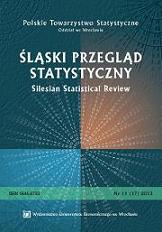The construction of well-being indicators: from definitions to measures and to interpretation
The construction of well-being indicators: from definitions to measures and to interpretation
Author(s): Filomena MagginoSubject(s): Economy
Published by: Wydawnictwo Uniwersytetu Ekonomicznego we Wrocławiu
Keywords: measurement of national well-being; well-being concepts; indicators’ definition and construction
Summary/Abstract: In order to measure and monitor a country’s well-being and progress, a particular path has to be followed, leading from concept to measure, to interpretation. The process requires: (a) defining the concepts to measure and monitor and their conceptual dimensions, together with the ambits (domains) in which the concepts are observed and monitored; (b) developing/selecting indicators; this requires the identification also of the appropriate techniques aimed at their synthesis; (c) defining the perspectives through which the indicators should be observed and the consistent organization of the monitoring process; (d) defining the interpretative/explanatory models, which actually link the obtained results to the previously defined concept. The widely accepted main concepts defining the progress of a country (or community) are the well-being of individuals (quality of life), its fair distribution (equity), and sustainable promotion (sustainability). The paper aims at (a) clarifying different issues concerning the well-being of societies by providing a conceptual instrument allowing anyone to orient themselves among all the emerging proposals and to distinguish between serious and propagandistic ones; (b) unravelling the primary methodological aspects and issues that should be considered in constructing indicators.
Journal: Śląski Przegląd Statystyczny
- Issue Year: 17/2013
- Issue No: 11
- Page Range: 95-122
- Page Count: 28
- Language: English

